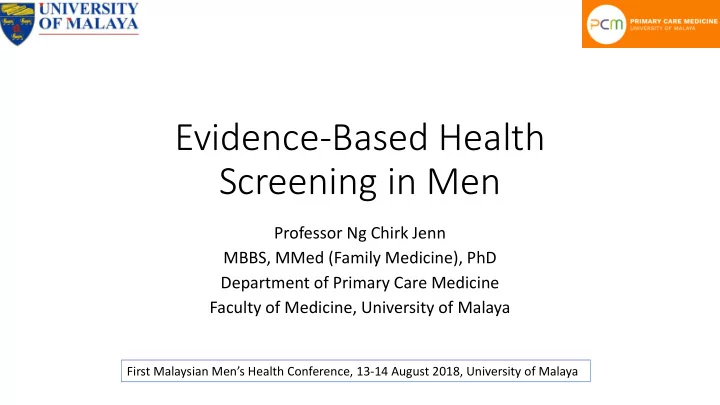

Evidence-Based Health Screening in Men Professor Ng Chirk Jenn MBBS, MMed (Family Medicine), PhD Department of Primary Care Medicine Faculty of Medicine, University of Malaya First Malaysian Men’s Health Conference, 13 -14 August 2018, University of Malaya
Poor Men’s Health: Cause Chromosomal • Biological Visceral fat immunological distributio disadvantage Sex hormones n References: Mendelsohn ME, Karas RH. The protective effects of estrogen on the cardiovascular system. The New England journal of medicine. 1999 Jun 10;340(23):1801-11. PubMed PMID: 10362825. Epub 1999/06/11. eng. Power ML, Schulkin J. Sex differences in fat storage, fat metabolism, and the health risks from obesity: possible evolutionary origins. British Journal of Nutrition. 2008;99(05):931-40. Libert C, Dejager L, Pinheiro I. The X chromosome in immune functions: when a chromosome makes the difference. Nature Reviews Immunology. 2010;10(8):594-604.
Poor Men’s Health: Cause • Behavioural ✓ risk-taking behaviour ✓ reluctant to engage in health promotion activity ✓ have lower health awareness ✓ feeling of invulnerability ✓ delay or avoid seeking help References: Addis ME, Mahalik JR. Men, masculinity, and the contexts of help seeking. The American psychologist. 2003 Jan;58(1):5-14. Byrnes JP, Miller DC, Schafer WD. Gender differences in risk taking: A meta-analysis. Psychological bulletin. 1999;125(3):367. Richardson N, Smith JA. National men's health policies in Ireland and Australia: what are the challenges associated with transitioning from development to implementation? Public health. 2011 Jul;125(7):424-32. PubMed PMID: 21726883. Epub 2011/07/06. eng. Banks I. New models for providing men with health care. Journal of Men's Health and Gender. 2004;1(2-3):155-8.
Male-sensitive In Intervention • Systematic review on health promoting interventions targeting men (Robertson 2008) • Holland et al used male personalised letters → increased screening uptake. • Stanton et al used father’s role → increased smoking quit rate. • Youl et al used sportsman signed letter → no difference in skin cancer screening uptake (compared to male sensitive control group) • Insufficient evidence supporting the effectiveness of male- sensitive intervention due to lack of studies. References: Robertson LM, Douglas F, Ludbrook A, Reid G, van Teijlingen E. What works with men? A systematic review of health promoting interventions targeting men. BMC health services research. 2008;8:141.
In Intervention to increase screening uptake Systematic review (Jepson 2000) • Interventions to increase screening uptake ➢ invitation appointments ➢ Letters and phone calls ➢ educational home visits ➢ opportunistic screening • Varying levels of effectiveness. • Not tailored to gender and technology is underutilised References: Jepson R, Clegg A, Forbes C, Lewis R, Sowden A, Kleijnen J. The determinants of screening uptake and interventions for increasing uptake: a systematic review. Health technology assessment (Winchester, England). 2000;4(14):i-vii, 1-133.
SOCSO Health Screening Programme 2017 • Uptake rate from 2013-2016 • Overall: 19.9% (479,666/2,411,027) • Male: 15.0% (224,484/1,501,527) • Female: 28.1% (255,182/909,500)
Reasons FOR Reasons FOR NOT using BSSK using BSSK BSSK is a top down Time consuming decision = 31.6 (73/191) = 36.8% (82/219) BSSK helps to Too lengthy facilitate screening = 28.3% (54/191) = 36.8% (82/219) BSSK is useful to Men refuse to improve the health answer status of men = 24.1% (46/191) = 24.7% (55/219 )
1. US Preventive Services Task Force 2. Malaysian Consensus Guidelines
Conclusion • Health screening intervention in men: • Educational interventions → effective in improving men's intention to and uptake of screening • Studies that used male-sensitive, ICT-based, video-based interventions are of poor quality • Need to conduct larger and more robust studies
ScreenMen Health Screening Web App
Reaching out to Men
Key Messages • Screening should start young and be based on the latest evidence • Current screening practices should be reviewed; they must be gender-sensitive and tailored to the needs of men • Innovative approaches, including the use of ICT, can be considered to improve screening uptake in men • Screening should be inclusive – vulnerable populations should not be neglected
Acknowledgement • Teo Chin Hai Department of Primary Care Medicine, University of Malaya • Dr Tun Firzara Department of Primary Care Medicine, University of Malaya • Professor Alan White Leeds Beckett University Email: ngcj@um.edu.my
Recommend
More recommend